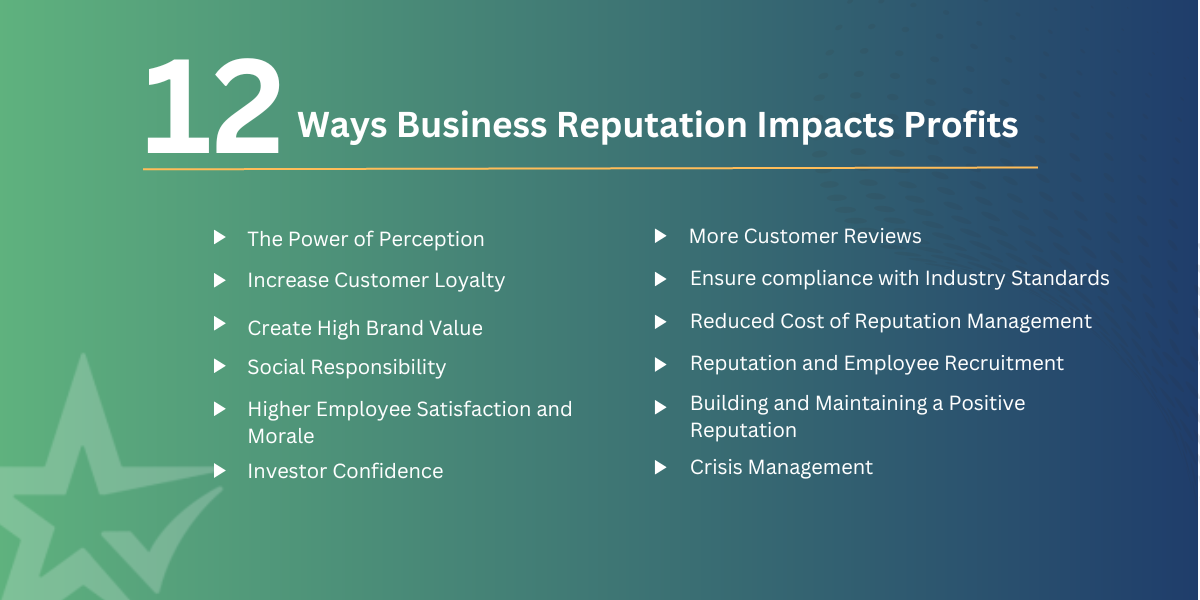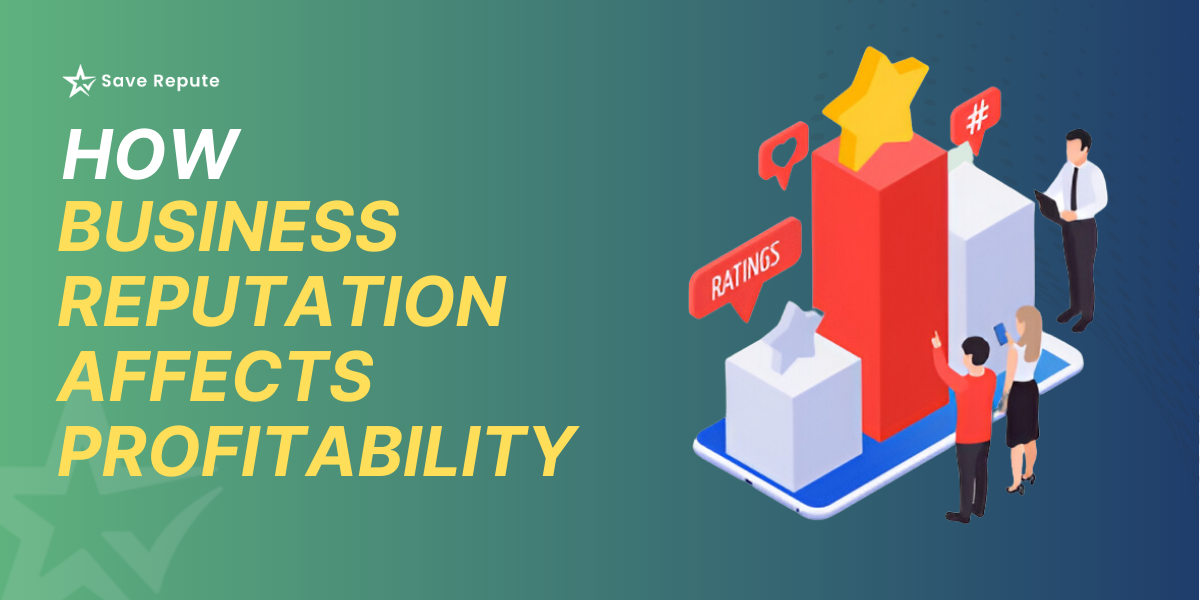Understanding how business reputation affects profitability helps you make more informed decisions. A company’s reputation is one of the most important factors in its success. It has the potential to influence how customers perceive the company and their willingness to do business with it.
SaveRepute is a done-for-you Online Reputation Management services
In this article, we will look at the impact of business reputation on profitability and offer suggestions on how businesses can improve their reputation to boost revenue.
12 Ways Business Reputation Impacts Profits

Here are some of the ways that business reputation affects profitability and trust:
The Power of Perception
In business, perception is everything. The perceptions of customers about a company can have a significant impact on its profitability. A company with a good reputation is more likely to attract customers, whereas a company with a bad reputation will find it difficult to attract and retain customers. As a result, maintaining a positive image is critical for businesses to ensure long-term profitability.
Increase Customer Loyalty
Customer loyalty is a key driver of profitability. A good reputation can help businesses build customer loyalty and retain existing customers. Customers who are satisfied are more likely to recommend a company to their friends and family, resulting in new business and increased profitability. A bad reputation, on the other hand, can result in customers leaving and negative word-of-mouth, resulting in reduced profits.
Create High Brand Value
Brand value is a critical factor in determining a company’s success. A strong reputation can have a significant impact on the value of a brand. A company with a positive reputation is more likely to have a high brand value, whereas a company with a negative reputation will have a lower brand value. Customers are willing to pay a premium for well-known brands, so higher brand value can lead to higher profitability.
Social Responsibility
Today, businesses are expected to operate in a socially responsible manner. Companies that have good reputations tend to work in a more ethical and socially responsible manner. In other words, a business with a positive online reputation is likely to engage in environmentally friendly practices or charitable activities. Because of these stances, these businesses can win over many customers.
Higher Employee Satisfaction and Morale
A good business reputation also means more satisfied customers, which translates into profits. Satisfied employees are more likely to provide good customer service, which can lead to positive customer experiences and increased business reputation affects profitability.
A company’s reputation can also have a significant impact on employee morale. Employees are more likely to work for a company with a good reputation and be proud of their work. A bad reputation, on the other hand, can lead to dissatisfied employees and high staff turnover. High staff turnover can result in lost productivity and increased recruitment and training costs, affecting the company’s profitability.
Investor Confidence
Investors play a critical role in a company’s growth and success. Investor confidence can be greatly influenced by a company’s reputation. A company with a positive reputation is more likely to attract investors, whereas a company with a negative reputation will struggle to secure investment. A lack of investment can slow the company’s growth and, ultimately, affect profitability.
More Customer Reviews
Customer reviews are an excellent way to assess a company’s reputation. Businesses with strong Personal reputation management will have more satisfied customers and hence more reviews. Positive feedback can attract new customers and increase sales. To maintain a positive reputation, businesses must actively monitor and respond to online reviews.
Ensure compliance with Industry Standards
Businesses with a strong reputation tend to adhere to industry standards and norms more closely. Such Companies attract more customers. In contrast, companies whose reputation is tarnished by unethical practices or high costs may experience declines in business reputation affects profitability and reputation.
Reduced Cost of Reputation Management
Maintaining a positive reputation requires resources, and the cost of reputation management can impact the profitability of a business. Companies with a positive reputation don’t need to spend much on managing their online reputation.
Reputation and Employee Recruitment
A company’s reputation can also impact its ability to attract and retain top talent. Prospective employees frequently research a company’s reputation before applying for a job. If the company has a poor reputation, it may have difficulty attracting the best candidates. A strong reputation, on the other hand, can attract high-quality candidates and increase employee retention rates.
Building and Maintaining a Positive Reputation
Building and maintaining a positive reputation requires ongoing effort and commitment from the company. This includes delivering high-quality products or services, providing excellent customer service, and engaging with customers and other stakeholders transparently and honestly. It also entails monitoring the company’s Reputation online and offline, also responding quickly and effectively to any negative feedback or criticism.
Crisis Management
Despite a company’s best efforts, the reputational damage can occur. In these situations, it is critical to have a crisis management plan in place to minimize damage and restore the company’s reputation as soon as possible. This may entail apologizing for any errors, taking corrective action, and communicating openly and transparently with customers and other stakeholders.
Conclusion
The reputation of a company is crucial to its success and business reputation affects profitability. It can have an impact on customer loyalty, brand value, employee morale, investor confidence, and the cost of reputation management. Companies must invest in reputation management strategies to maintain a positive image and attract and retain customers. Failure to do so may have negative consequences, affecting the bottom line. Businesses can increase their profitability and achieve long-term success by prioritizing reputation management. You can Contact us for more detailed discussions.


